|
|
|
Sort Order |
|
|
|
Items / Page
|
|
|
|
|
|
|
| Srl | Item |
| 1 |
ID:
025825


|
|
|
|
|
| Publication |
London, MacDonald, 1972.
|
| Description |
vii, 188p.Hbk
|
| Standard Number |
356039692
|
|
|
|
|
|
|
|
|
|
|
|
Copies: C:1/I:0,R:0,Q:0
Circulation
| Accession# | Call# | Current Location | Status | Policy | Location |
| 010701 | 940.53/WYK 010701 | Main | On Shelf | General | |
|
|
|
|
| 2 |
ID:
131430
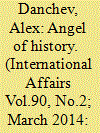

|
|
|
|
|
| Publication |
2014.
|
| Summary/Abstract |
This article explores the way in which art can illuminate war, in particular the Great War. It focuses on Paul Klee's painting, Angelus novus (1920), and the interpretation of that painting by Walter Benjamin, who owned it, in his celebrated theses 'On the concept of history' (1940). Benjamin's interpretation was a kind of parable: he called it the angel of history. Some have taken inspiration from that characterization; others have offered striking alternatives, including Kaiser Wilhelm II and even Adolf Hitler. The article traces the evolution of these identifications; it also considers the continuing artistic response, in historical perspective-notably Anselm Kiefer's The angel of history: poppy and memory (1989). It argues that our conception of the war, and of all wars, is profoundly affected by artistic imagination, and re-imagination.
|
|
|
|
|
|
|
|
|
|
|
|
|
|
|
|
| 3 |
ID:
093426
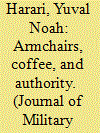

|
|
|
| 4 |
ID:
131424
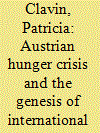

|
|
|
|
|
| Publication |
2014.
|
| Summary/Abstract |
From its foundation in 1918, the new Austrian republic was gripped by famine and a crisis of confidence in its currency that threatened to tip the new state into hyperinflation and revolution. This article shows how western efforts to aid Austria combat famine and its financial crisis were linked, and how they had a profound impact on the new League of Nations, the world's first multi-purpose intergovernmental organization. It also demonstrates the importance of the incipient wartime international bureaucracy for League agency. Contrary to the expectations of its architects, member governments, international financiers, businessmen and economists began to see the League as a useful tool to meet common needs that today would be called the search for human security. The article demonstrates how the Austrian food and financial crisis was the founding moment in the institutionalization of international economic and financial coordination, cooperation and oversight. It established the Economic and Financial Organization of the League of Nations, whose work would later inform its successors, the International Monetary Fund, the World Bank and the European Union. The study speaks to the ways in which the notion of security has broadened in the past two decades to embrace economic, social, political and environmental concerns. But the notion of 'human security' is not new; it was written into the body of the League.
|
|
|
|
|
|
|
|
|
|
|
|
|
|
|
|
| 5 |
ID:
124411
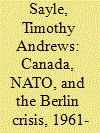

|
|
|
|
|
| Publication |
2013.
|
| Summary/Abstract |
Historians of Canadian foreign affairs have argued that Canada played an important role in influencing allied policy during the Berlin Crisis of 1961-1962. Newly declassified documents reveal the opposite. Canada opposed much of the North Atlantic Treaty Organization (NATO) contingency planning during the crisis, especially plans calling for the demonstrative use of nuclear weapons. Despite Canada's efforts to modify NATO's Berlin Contingency plans (BERCONs), Canadian diplomats found themselves isolated in the North Atlantic Council (NAC) and accepted plans they considered to be dangerous. Canada had no significant influence on NATO military planning during one of the most serious crises of the Cold War.
|
|
|
|
|
|
|
|
|
|
|
|
|
|
|
|
| 6 |
ID:
124652
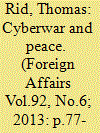

|
|
|
|
|
| Publication |
2013.
|
| Summary/Abstract |
Cyberwar Is Coming!" declared the title of a seminal 1993 article by the RAND Corporation analysts John Arquilla and David Ronfeldt, who argued that the nascent Internet would fundamentally transform warfare. The idea seemed fanciful at the time, and it took more than a decade for members of the U.S. national security establishment to catch on. But once they did, a chorus of voices resounded in the mass media, proclaiming the dawn of the era of cyberwar and warning of its terrifying potential. In February 2011, then CIA Director Leon Panetta warned Congress that "the next Pearl Harbor could very well be a cyberattack." And in late 2012, Mike McConnell, who had served as director of national intelligence under President George W. Bush, warned darkly that the United States could not "wait for the cyber equivalent of the collapse of the World Trade Centers."
|
|
|
|
|
|
|
|
|
|
|
|
|
|
|
|
| 7 |
ID:
130914
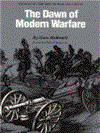

|
|
|
|
|
| Publication |
London, University of Nebraska press, 1990.
|
| Description |
xi, 487p.Pbk
|
| Contents |
Vol IV
|
| Standard Number |
0803265867
|
|
|
|
|
|
|
|
|
|
|
|
Copies: C:1/I:0,R:0,Q:0
Circulation
| Accession# | Call# | Current Location | Status | Policy | Location |
| 057775 | 355.009/DEL 057775 | Main | On Shelf | General | |
|
|
|
|
| 8 |
ID:
001917
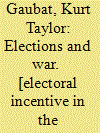

|
|
|
|
|
| Publication |
California, Stanford University Press, 1999.
|
| Description |
xii, 208p.
|
| Standard Number |
0804835662
|
|
|
|
|
|
|
|
|
|
|
|
Copies: C:1/I:0,R:0,Q:0
Circulation
| Accession# | Call# | Current Location | Status | Policy | Location |
| 043120 | 324.9/GAU 043120 | Main | On Shelf | General | |
|
|
|
|
| 9 |
ID:
131050
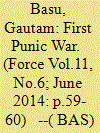

|
|
|
|
|
| Publication |
2014.
|
| Summary/Abstract |
The two leading Mediterranean powers in the post-Greek world clashed in three Punic Wars in the first of which Rome, now master of all Italy, overran Sicily, reinvented itself as a naval power and took its armies beyond Europe for the first time to Carthage in Africa
By the mid-3rd century BC, Romans had secured the whole of the Italian peninsula defeating in about 100 years every rival on mainland Italy. First the Latin League dissolved in the Latin War, then the Samnites were subjugated in three Samnite wars, and finally the cities of Magna Grecia submitted to Rome after Pyrrhus of Epirus withdrew (see FORCE May 2014). Barely decades after the last Pyrrhic War, Rome fought outside Italy for the first time. The First Punic War (264-241 BC) was the first of three fought between Carthage and the Roman Republic for supremacy in the western Mediterranean Sea. It was localised on the island of Sicily but Roman legions also landed on African soil. Carthage, located in today's Libya and Tunisia, was the world's leading naval power at that time. These wars were called 'Punic' from the Latin name for Carthaginians - 'Punici' derived from 'Phoenici' - who traced their origins to the Semitic-speaking peoples of North Africa descending from Phoenician traders of modern Lebanon and who spoke the Punic language. The Second Punic War (218-201 BC) is most remembered in military history for Hannibal's great crossing of the Alps with elephants to do what no man did before: attack Rome overland from the north. The Third Punic War (149-146 BC) involved an extended siege of Carthage, culminating in its conquest by Rome, ending the tale of one of the most illustrious military rivalries in history.
|
|
|
|
|
|
|
|
|
|
|
|
|
|
|
|
| 10 |
ID:
101586
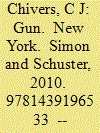

|
|
Gun
/ Chivers, C J
|
2010

|
|
|
|
| Publication |
New York, Simon and Schuster, 2010.
|
| Description |
481p.Hbk
|
| Standard Number |
9781439196533
|
|
|
|
|
|
|
|
|
|
|
|
Copies: C:1/I:0,R:0,Q:0
Circulation
| Accession# | Call# | Current Location | Status | Policy | Location |
| 055647 | 623.4424/CHI 055647 | Main | On Shelf | General | |
|
|
|
|
| 11 |
ID:
001288
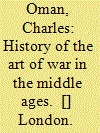

|
|
|
|
|
| Publication |
London, Greenhill Books, 1998.
|
| Description |
v.1 (xx, 576p.) V.2 (xi, 459p.)
|
| Standard Number |
1853673315
|
|
|
|
|
|
|
|
|
|
|
|
Copies: C:2/I:0,R:0,Q:0
Circulation
| Accession# | Call# | Current Location | Status | Policy | Location |
| 040812 | 355.02/OMA 040812 | Main | On Shelf | General | |
| 040813 | 355.02/OMA 040813 | Main | On Shelf | General | |
|
|
|
|
| 12 |
ID:
131918
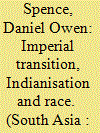

|
|
|
|
|
| Publication |
2014.
|
| Summary/Abstract |
This article examines the colonial legacies in the development of the Indian and Pakistani navies following Independence. As both navies struggled with problems of indigenising their forces, Britain endeavoured to maintain its regional hegemony by extending the professional dependency of both. The influence of imperial ideologies and racial discourses of power on these relationships and on Indian naval identity caused India's and Pakistan's navies to evolve in different directions, as did Cold War geopolitics and civil-military relations. By analysing the challenges faced by India in achieving strategic independence, this article widens existing debates surrounding the neo-colonialism of Indian governance and education during the Nehruvian period, the reinvigoration of Empire and the limits of British imperial power after World War II.
|
|
|
|
|
|
|
|
|
|
|
|
|
|
|
|
| 13 |
ID:
057797
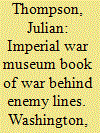

|
|
|
|
|
| Publication |
Washington, D. C., Brassey's, 1998.
|
| Description |
xxix, 476p.Pbk
|
| Standard Number |
157488381X
|
|
|
|
|
|
|
|
|
|
|
|
Copies: C:1/I:0,R:0,Q:0
Circulation
| Accession# | Call# | Current Location | Status | Policy | Location |
| 045105 | 940.541/THO 045105 | Main | On Shelf | General | |
|
|
|
|
| 14 |
ID:
046064
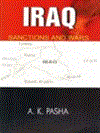

|
|
|
|
|
| Publication |
New Delhi, Sterling Publishers Private Limited, 2003.
|
| Description |
ix, 163p.Hbk
|
| Standard Number |
8120725611
|
|
|
|
|
|
|
|
|
|
|
|
Copies: C:2/I:0,R:0,Q:0
Circulation
| Accession# | Call# | Current Location | Status | Policy | Location |
| 046867 | 956.7/PAS 046867 | Main | On Shelf | General | |
| 057888 | 956.7/PAS 057888 | Main | On Shelf | General | |
|
|
|
|
| 15 |
ID:
131434
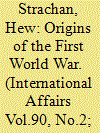

|
|
|
|
|
| Publication |
2014.
|
| Summary/Abstract |
The recent crop of books on the origins of the First World War dispenses with the notion of inevitability in the outbreak of war, and stresses the maturity of European civilization in 1914. They are in danger of prioritizing urban life over rural, civilization and culture over backwardness and superstition. They also say less than they might about the enduring place of war in international relations. The stress on contingency is to be welcomed for getting history away from the determinism of long-term trends, and for reopening the uncertainty of the outcomes still open to the Great Powers in 1914. However, the overall effect is cyclical. The prevailing wisdom on the reasons for war has reverted to the argument that 'Europe slithered over the brink', which dominated from the 1930s until the publications of Fritz Fischer in the 1960s. This does not mean that 'Fischerism', with its belief in German war guilt, is extinct. The challenge which now confronts historians, as they approach a four-year centenary, is to break this circularity and to explore new paths.
|
|
|
|
|
|
|
|
|
|
|
|
|
|
|
|
| 16 |
ID:
128218
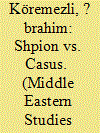

|
|
|
|
|
| Publication |
2014.
|
| Summary/Abstract |
In October 1853, a war erupted between the Russian and the Ottoman empires, which became the celebrated Crimean War in the following year. The Danubian theatre, one of the crucial scenes of the war, witnessed both belligerents trying to discover the other's activities and planned operations. As they were inhabited by cosmopolitan and heterogeneous populations, Dobruca (Dobruja) and Bessarabia were the most convenient places for both parties to gather military intelligence. The Ottomans acquired information via the Wallachians and the Cossacks, as well as by diplomatic missions and various merchants. The Ottoman Empire's Orthodox Christian subjects - the Bulgarians and Greeks - assisted Russia in gathering information from the right bank of the Danube. Some of these reports were unreliable, as were the spies themselves. The Russian and Ottoman archives have rich resources related to military intelligence, which is an understudied aspect of the Crimean War. Relying upon the archival sources, this paper aims to discuss an entirely ignored topic: the espionage activities in the Balkan theatre during the Crimean War.
|
|
|
|
|
|
|
|
|
|
|
|
|
|
|
|
| 17 |
ID:
128540
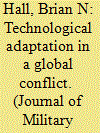

|
|
|
|
|
| Publication |
2014.
|
| Summary/Abstract |
This article seeks to contribute to recent scholarly analysis of the British Army's military performance and its leadership's willingness and ability to adapt during the First World War (1914-1918) by examining a maligned, though vital, aspect of its command and control system, communications. It offers a comparative assessment of the development and contribution of communications to British operations beyond the Western Front and concludes that the army was, on the whole, remarkably successful at adapting its communications system to suit the demands of fighting a modern, global conflict.
|
|
|
|
|
|
|
|
|
|
|
|
|
|
|
|
| 18 |
ID:
091586
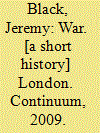

|
|
|
|
|
| Publication |
London, Continuum, 2009.
|
| Description |
viii, 184p.
|
| Standard Number |
9780826422767
|
|
|
|
|
|
|
|
|
|
|
|
Copies: C:1/I:0,R:0,Q:0
Circulation
| Accession# | Call# | Current Location | Status | Policy | Location |
| 054491 | 355.02/BLA 054491 | Main | On Shelf | General | |
|
|
|
|
| 19 |
ID:
002100
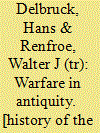

|
|
|
|
|
| Publication |
London, University of Nebraska press, 1990.
|
| Description |
604p.
|
| Standard Number |
080329199X
|
|
|
|
|
|
|
|
|
|
|
|
Copies: C:1/I:0,R:0,Q:0
Circulation
| Accession# | Call# | Current Location | Status | Policy | Location |
| 033260 | 355.009/DEL.1 033260 | Main | On Shelf | General | |
|
|
|
|
| 20 |
ID:
100734
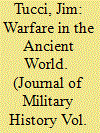

|
|
|
|
|
|
|
|